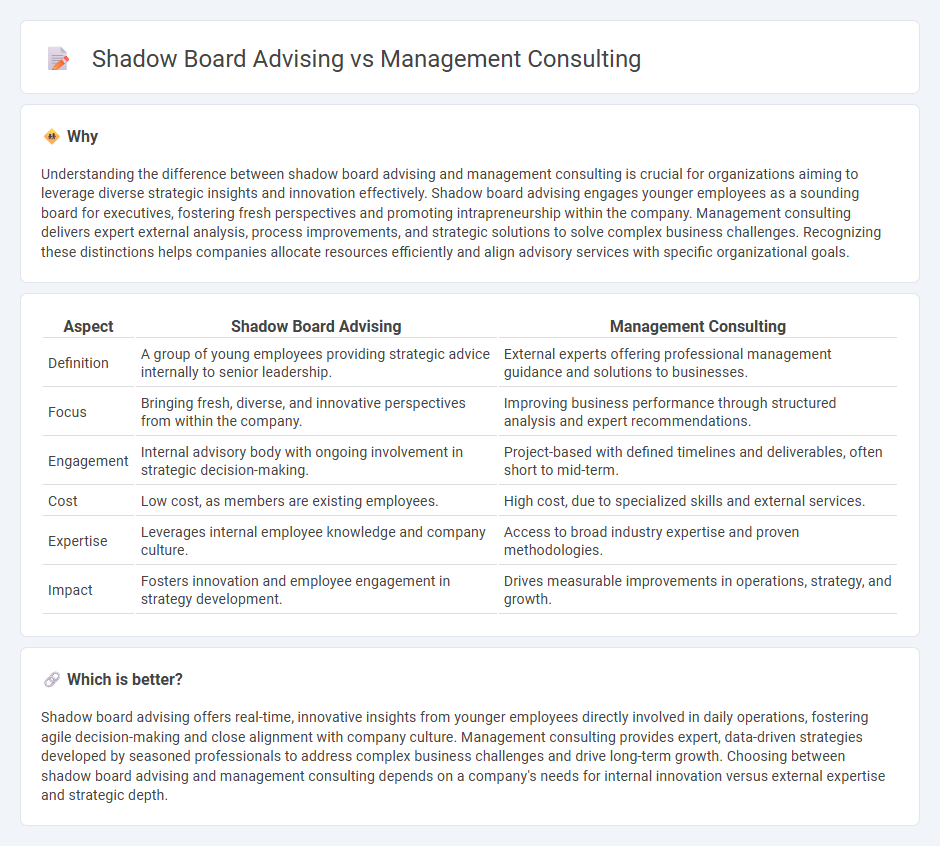
Shadow board advising offers innovative insights by involving emerging talent directly in strategic decision-making, fostering agility and forward-thinking within organizations. Management consulting focuses on delivering expert analysis and tailored solutions to optimize business performance, operational efficiency, and growth strategies. Discover how integrating shadow boards with traditional consulting can transform your company's leadership and outcomes.
Why it is important
Understanding the difference between shadow board advising and management consulting is crucial for organizations aiming to leverage diverse strategic insights and innovation effectively. Shadow board advising engages younger employees as a sounding board for executives, fostering fresh perspectives and promoting intrapreneurship within the company. Management consulting delivers expert external analysis, process improvements, and strategic solutions to solve complex business challenges. Recognizing these distinctions helps companies allocate resources efficiently and align advisory services with specific organizational goals.
Comparison Table
| Aspect | Shadow Board Advising | Management Consulting |
|---|---|---|
| Definition | A group of young employees providing strategic advice internally to senior leadership. | External experts offering professional management guidance and solutions to businesses. |
| Focus | Bringing fresh, diverse, and innovative perspectives from within the company. | Improving business performance through structured analysis and expert recommendations. |
| Engagement | Internal advisory body with ongoing involvement in strategic decision-making. | Project-based with defined timelines and deliverables, often short to mid-term. |
| Cost | Low cost, as members are existing employees. | High cost, due to specialized skills and external services. |
| Expertise | Leverages internal employee knowledge and company culture. | Access to broad industry expertise and proven methodologies. |
| Impact | Fosters innovation and employee engagement in strategy development. | Drives measurable improvements in operations, strategy, and growth. |
Which is better?
Shadow board advising offers real-time, innovative insights from younger employees directly involved in daily operations, fostering agile decision-making and close alignment with company culture. Management consulting provides expert, data-driven strategies developed by seasoned professionals to address complex business challenges and drive long-term growth. Choosing between shadow board advising and management consulting depends on a company's needs for internal innovation versus external expertise and strategic depth.
Connection
Shadow board advising enhances management consulting by offering real-time, innovative insights from emerging leaders who reflect current market trends and organizational challenges. This collaborative approach helps management consultants design agile strategies that align with evolving business environments and stakeholder expectations. Integrating shadow boards into consulting processes strengthens decision-making, fosters diverse perspectives, and drives sustainable growth.
Key Terms
Strategy formulation
Management consulting involves external experts providing strategic formulation by analyzing market trends, competitive landscapes, and internal capabilities to deliver actionable recommendations. Shadow board advising consists of a select group of junior employees collaborating internally with senior executives to co-create strategies, fostering innovation and diverse perspectives. Discover how each approach uniquely influences effective strategy formulation and organizational growth.
Decision-making authority
Management consulting typically offers expert advice without direct decision-making authority, influencing strategy through recommendations based on industry analysis and best practices. Shadow boards consist of internal junior executives or employees granted decision-making power to provide fresh perspectives and impact company policies. Explore the distinct roles and benefits of management consulting and shadow board advising to understand their influence on organizational decisions.
Organizational innovation
Management consulting offers external expertise to identify inefficiencies and design strategic initiatives for organizational innovation, leveraging industry benchmarks and best practices. Shadow board advising engages younger or frontline employees in decision-making processes, fostering a culture of innovation by incorporating diverse perspectives directly into leadership strategies. Explore how integrating both approaches can drive transformative change and enhance organizational innovation.
Source and External Links
Management consulting - Wikipedia - Management consulting involves providing organizations with expert advice and services to improve performance, covering areas such as organizational change, strategy development, and operational improvement, without becoming part of the client's organization.
What Is Management Consulting? - Forage - Management consulting offers advisory and implementation services to enhance business strategies, operations, and performance, spanning domains like strategy, operations, HR, and digital transformation, with the market expected to grow substantially in the coming years.
What Is Management Consulting? - Management consultants are experts who analyze and solve complex financial and operational problems through research-backed strategies, providing objective, external insights to organizations experiencing challenges or seeking efficiency improvements.
 dowidth.com
dowidth.com